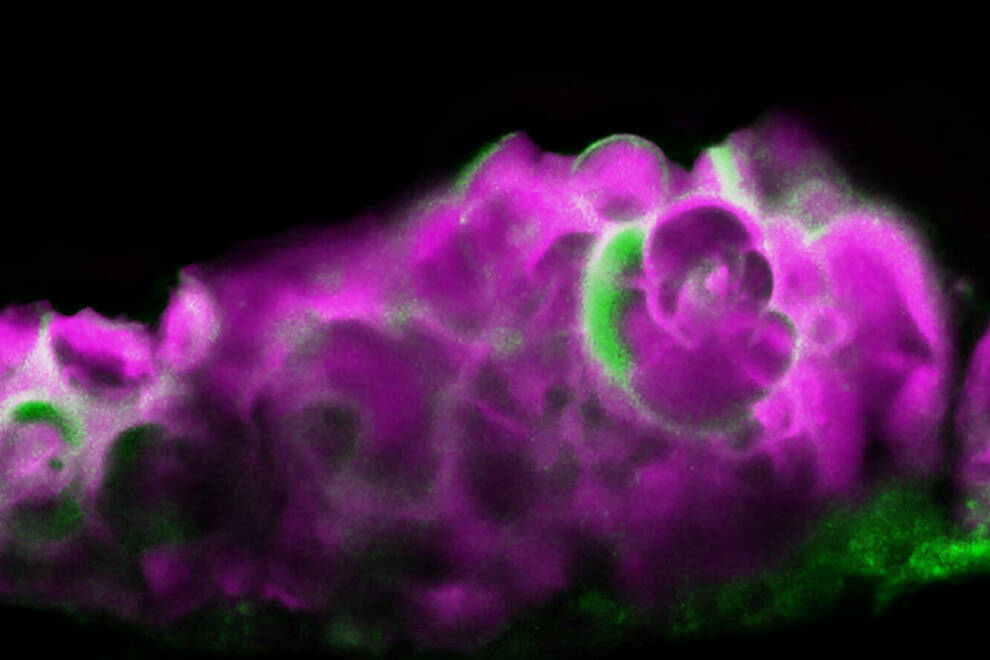We use essential cookies for the proper functioning of the website and additional ones to make interaction with the site as convenient as possible. It helps us personalize your user experience as well as obtain analytical information to improve the service.
If you agree to accept all cookies, click "Accept all"; if not, click "Only essential". To learn more, view the Cookie Policy.

Scientists have discovered a new way to restore vision
To understand whether it is possible to restore vision, you need to know what causes it to deteriorate.
It is known that macular degeneration is triggered by calcium, which is analogous to hydroxyapatite found in teeth. This element creates deposits on the back of the eyeballs that reduce the quality of vision with age. In addition, the accumulation of the mineral on the eye wall aggravates age-related macular degeneration. This happens especially often in people over 50 years old.
But in research led by Imre Lengjelier (an ophthalmologist at Queen's University in Scotland), scientists discovered amelotine: a protein involved in sediment mineralization. If this discovery is confirmed, then scientists will be able to find ways to stop vision loss and effective ways to treat patients.
For the first time, the study of deposits consisting of mineralized hydroxyapatite, researchers began in 2015. The ophthalmological team found that calcium is located under the pigment layer of the fiber behind the retina. The function of the retina is to protect the cones and rods that are sensitive to the light source. By blocking the supply of oxygen and other nutrients to the retinal epithelium, mineral deposits make the "picture" blurry and thus distort human vision. Researchers have grown retinal pigment cells in the laboratory. And then they were forced to "starve" by interrupting the supply of nutrients and oxygen.
“One of the main reasons for visual impairment is that the vessels do not deliver blood and other necessary components on time. We are currently looking for a way to inhibit amelotine to prevent and delay the formation of mineral deposits. If we manage to achieve what we want, we will save the eyesight of millions of people, ”said Graham Whistow, a specialist at the National Eye Institute.
To understand whether it is possible to restore vision, you need to know what causes it to deteriorate.
In the meantime, scientists are working on new discoveries, you can find high-quality glasses on our website in this section.
It is known that macular degeneration is triggered by calcium, which is analogous to hydroxyapatite found in teeth. This element creates deposits on the back of the eyeballs that reduce the quality of vision with age. In addition, the accumulation of the mineral on the eye wall aggravates age-related macular degeneration. This happens especially often in people over 50 years old.
But in research led by Imre Lengjelier (an ophthalmologist at Queen's University in Scotland), scientists discovered amelotine: a protein involved in sediment mineralization. If this discovery is confirmed, then scientists will be able to find ways to stop vision loss and effective ways to treat patients.
For the first time, the study of deposits consisting of mineralized hydroxyapatite, researchers began in 2015. The ophthalmological team found that calcium is located under the pigment layer of the fiber behind the retina. The function of the retina is to protect the cones and rods that are sensitive to the light source. By blocking the supply of oxygen and other nutrients to the retinal epithelium, mineral deposits make the "picture" blurry and thus distort human vision. Researchers have grown retinal pigment cells in the laboratory. And then they were forced to "starve" by interrupting the supply of nutrients and oxygen.
“One of the main reasons for visual impairment is that the vessels do not deliver blood and other necessary components on time. We are currently looking for a way to inhibit amelotine to prevent and delay the formation of mineral deposits. If we manage to achieve what we want, we will save the eyesight of millions of people, ”said Graham Whistow, a specialist at the National Eye Institute.
this section.
It is known that macular degeneration is triggered by calcium, which is analogous to hydroxyapatite found in teeth. This element creates deposits on the back of the eyeballs that reduce the quality of vision with age. In addition, the accumulation of the mineral on the eye wall aggravates age-related macular degeneration. This happens especially often in people over 50 years old.
But in research led by Imre Lengjelier (an ophthalmologist at Queen's University in Scotland), scientists discovered amelotine: a protein involved in sediment mineralization. If this discovery is confirmed, then scientists will be able to find ways to stop vision loss and effective ways to treat patients.
For the first time, the study of deposits consisting of mineralized hydroxyapatite, researchers began in 2015. The ophthalmological team found that calcium is located under the pigment layer of the fiber behind the retina. The function of the retina is to protect the cones and rods that are sensitive to the light source. By blocking the supply of oxygen and other nutrients to the retinal epithelium, mineral deposits make the "picture" blurry and thus distort human vision. Researchers have grown retinal pigment cells in the laboratory. And then they were forced to "starve" by interrupting the supply of nutrients and oxygen.
“One of the main reasons for visual impairment is that the vessels do not deliver blood and other necessary components on time. We are currently looking for a way to inhibit amelotine to prevent and delay the formation of mineral deposits. If we manage to achieve what we want, we will save the eyesight of millions of people, ”said Graham Whistow, a specialist at the National Eye Institute.
To understand whether it is possible to restore vision, you need to know what causes it to deteriorate.
In the meantime, scientists are working on new discoveries, you can find high-quality glasses on our website in this section.
It is known that macular degeneration is triggered by calcium, which is analogous to hydroxyapatite found in teeth. This element creates deposits on the back of the eyeballs that reduce the quality of vision with age. In addition, the accumulation of the mineral on the eye wall aggravates age-related macular degeneration. This happens especially often in people over 50 years old.
But in research led by Imre Lengjelier (an ophthalmologist at Queen's University in Scotland), scientists discovered amelotine: a protein involved in sediment mineralization. If this discovery is confirmed, then scientists will be able to find ways to stop vision loss and effective ways to treat patients.
For the first time, the study of deposits consisting of mineralized hydroxyapatite, researchers began in 2015. The ophthalmological team found that calcium is located under the pigment layer of the fiber behind the retina. The function of the retina is to protect the cones and rods that are sensitive to the light source. By blocking the supply of oxygen and other nutrients to the retinal epithelium, mineral deposits make the "picture" blurry and thus distort human vision. Researchers have grown retinal pigment cells in the laboratory. And then they were forced to "starve" by interrupting the supply of nutrients and oxygen.
“One of the main reasons for visual impairment is that the vessels do not deliver blood and other necessary components on time. We are currently looking for a way to inhibit amelotine to prevent and delay the formation of mineral deposits. If we manage to achieve what we want, we will save the eyesight of millions of people, ”said Graham Whistow, a specialist at the National Eye Institute.
this section.


